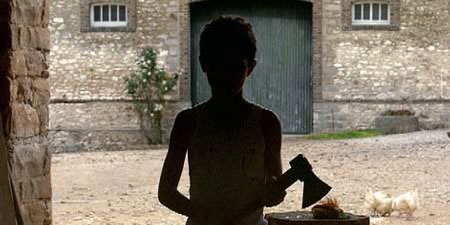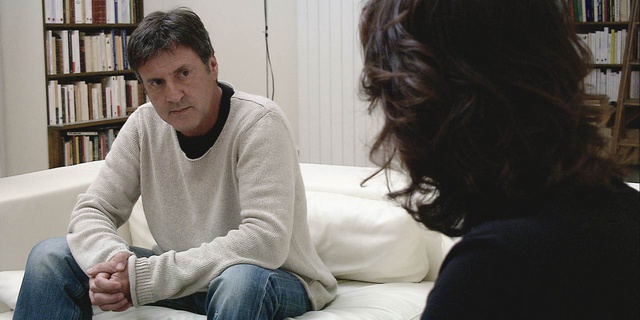“‘After more than six decades, the Academy is returning to some of its earlier roots, when a wider field competed for the top award of the year,’ said academy President Sid Ganis. ‘The final outcome, of course, will be the same – one Best Picture winner – but the race to the finish line will feature 10, not just five, great movies from 2009.’” Most likely realizing that a nod for The Dark Knight last year would’ve doubled their television ratings, the Academy Awards pads out to ten Best Picture nominees.
Ten, really? I know I pick 20 movies for my review round-up every year, but still: most years it’s hard to come up with five or six worthy nominees, much less ten. It’d be better if they went to a system where “up to” ten movies were chosen, but not necessarily that many if the pickings were slim that year. In any case, maybe Hollywood needed an “Oscar Stimulus Package,” but given that it’s still the same people voting for the winners, I tend to think the Academy will probably continue to get it wrong most years regardless. Just looking at the past decade:
1999: American Beauty wins. Not a particularly poor choice by Academy standards, I guess, but the other nominees include a sop to the box office (The Sixth Sense) and by-the-numbers drek like The Cider House Rules and The Green Mile. (Only other worthy nominee: The Insider.) Meanwhile, many of the best and most groundbreaking films of the year — Three Kings, Being John Malkovich, Fight Club, The Matrix — are all overlooked.
2000: Gladiator. Terrible choice. The worthy nominees are Traffic, Crouching Tiger, Hidden Dragon, and *possibly* Erin Brockovich. Chocolat makes the cut thanks to the Miramax machine. Left unnominated: Requiem for a Dream, Wonder Boys, O Brother Where Art Thou, and High Fidelity.
2001: A Beautiful Mind. A stunningly bad choice, and easily the worst of the five films nominated. The Oscar should probably have gone to In the Bedroom or Fellowship of the Ring, although Gosford Park and (tho’ I didn’t like it much) Moulin Rouge! are respectable picks. Left off the wheel: Mulholland Drive, Memento, The Royal Tenenbaums, Ghost World, Amelie, and Sexy Beast.
2002: Chicago — I never saw it, but not a particularly good year for film anyway. Gangs of New York, The Two Towers, and The Pianist all make sense as contenders. The Hours (another Miramax film)…not so much. Possible adds: The 25th Hour, Y Tu Mama Tambien, Far from Heaven, About a Boy.
2003: Return of the King runs away with everything, which is deserving but also feels somewhat dutiful after the previous two years. (FotR is easily the best film of the three, imho.) Most of the other nominees are well-chosen — Lost in Translation,
Master and Commander, Mystic River — with the possible exception of Seabiscuit. Other possibles include The Quiet American, Finding Nemo, Dirty Pretty Things, House of Sand and Fog, Monster, City of God, and L’Auberge Espagnole…but it’s probably more likely that extra nods would’ve gone to the heaps of middling Oscar bait that year, like Cold Mountain, The Last Samurai, or 21 Grams.
2004: Million Dollar Baby. A certifiable stinker, and arguably Clint Eastwood’s least-deserving movie of the decade. (Mystic River or Letters from Iwo Jima are closer to caliber.) It beats out The Aviator and Sideways, as well as Finding Neverland (Miramax) and Ray (never saw it). Off the board: Hotel Rwanda, Before Sunset, Garden State, Kinsey, The Assassination of Richard Nixon, Spiderman 2, In Good Company, The Incredibles, and — most egregiously — Eternal Sunshine of the Spotless Mind. If I had to guess, Closer and Kill Bill Vol. 2 (Miramax) might’ve snagged undeserving nods in a field of ten.
2005: Crash. Another woeful pick, it won over a respectable field of contenders (Brokeback Mountain, Capote, Good Night, and Good Luck, Munich.) That being said, Syriana and the best film of 2005, The New World, weren’t even nominated. Neither were Layer Cake, Ballets Russes, A History of Violence, The Squid and the Whale, Cache, Match Point, The Constant Gardener, Grizzly Man, Batman Begins, or The Three Burials of Melquiades Estrada. All these — and many others — were better than Crash.
2006: Scorsese wins a charity Oscar with The Departed, beating out worthwhiles Letters from Iwo Jima (the best choice of the 5) and The Queen, as well as more dubious picks Little Miss Sunshine and Babel. The best film of the year, United 93, isn’t nominated. Nor is Children of Men, The Lives of Others, The Prestige, The Fountain, Pan’s Labyrinth, or Inside Man. It’s reasonable to suspect that additional Oscar nods might’ve gone to the likes of The Last King of Scotland, Little Children, Notes from a Scandal, and The Pursuit of Happyness.
2007: No Country for Old Men — A fine choice. I’d say this year Oscar almost got it right…but the other nominees are still somewhat suspect. Michael Clayton, ok, There Will Be Blood, sure. But Atonement and Juno? I’d rather have seen The Diving Bell & the Butterfly, Zodiac, The Savages, Charlie Wilson’s War, In the Valley of Elah, The Assassination of Jesse James, Before the Devil Knows You’re Dead, 4 Months, 3 Weeks, & 2 Days, or my favorite film of the year, I’m Not There, get their due.
2008: Slumdog Millionaire (ugh) beats out Milk, Benjamin Button, Frost/Nixon and The Reader. Of those, Milk and F/N are solid, and ideally would’ve been paired with The Dark Knight, The Wrestler, Let the Right One In, and/or WALL-E. Other possibles include Man on Wire, Snow Angels, Waltz with Bashir, Vicky Christina Barcelona, Iron Man, and The Visitor…although it seems more likely Oscar would’ve gone with Gran Torino, A Christmas Tale, Doubt, Revolutionary Road, or Valkyrie.
So, to review, in only one of the past ten years (2003) did Oscar pick the movie i’d argue was actually the best that year, although even that one feels a bit de rigueur. (Admittedly, they came close in 2007 as well.) In six of those ten years (1999, 2004-2008), my best film of the year wasn’t even nominated. In four of those ten years (’01, ’04, ’05, ’08), a — to my mind, of course — certifiably lousy film won Best Picture. And in three other years — ’99, ’00, and ’06 — an at best middling movie won the top prize. Not exactly what you’d call a record of distinction.


